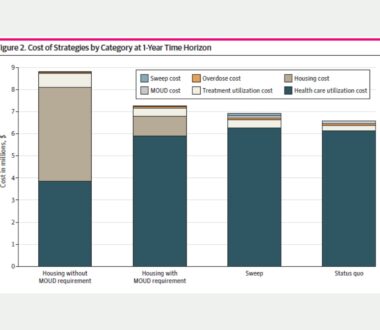
Cost-Effectiveness Analysis of Peer-delivered Services in South Africa
The fight against HIV in South Africa is complicated by alcohol and other drug use (AOD), which has been cited as a common barrier to adherence of antiretroviral therapy (ART). The economic burden of disordered alcohol use further strains the country’s public health resources through increased healthcare utilization, social welfare payments, crime, and lost productivity. […]

Improving Substance Use Treatment Access in Criminal-legal Systems through JCOIN 2.0
On September 29, 2025, the Justice Community Overdose Innovation Network (JCOIN) kicked off Phase II of its new five-year cycle that represents an estimated $33 million in research investments in 2025. Awarded by the National Institute on Drug Abuse (NIDA) as part of the NIH HEAL Initiative, the investments help establish clinical research hubs and […]

Understanding the Costs of Using Implementation Facilitation to Implement Emergency Department-Initiated Buprenorphine
Buprenorphine, when prescribed in the emergency department (ED), increases the chances for treatment engagement and retention among patients with opioid use disorder (OUD). The patient uptake and clinical administration of ED-initiated buprenorphine for OUD, however, has been slow despite evidence of its effectiveness. Implementation facilitation (IF), a strategy that leverages external facilitators and a local […]

Health and Economic Outcomes of Addressing Encampments of Individuals Using Opioids
Lead author Hana Zwick, a research data analyst at the Syndemics Lab, and colleagues published a new simulation modeling study in JAMA Network Open to understand the public health and economic outcomes of strategies that arrest, disperse, or house people who live in encampments and experience high-risk opioid use compared to the encampment status quo. […]

A Cost-Effectiveness of Implementation Facilitation to Promote Emergency Department–Initiated Buprenorphine for Opioid Use Disorder
In the last eight years, emergency departments (EDs) have seen an influx of visits related to opioid use disorder (OUD). For the same reason, researchers have been citing EDs to be a critical setting and reachable moment for initiating OUD medications, the gold standard of care. Buprenorphine is advantageous as a low-barrier OUD treatment compared […]

Improving Care for Opioid Use Disorder in the Criminal-Legal System
Substance use disorders (SUD), and especially opioid use disorder (OUD), are prevalent within the criminal-legal system. Recently, there has been increased alignment of OUD care across the criminal-legal system with the patient-centered American Society of Addiction Medicine guidelines. Whether by choice or through legislation, carceral facilities are increasingly offering FDA-approved medications for OUD (MOUD), which […]

Economic Evaluations of Establishing Opioid Overdose Prevention Centers in 12 North American Cities: A Systematic Review
In this systematic literature review published in Value in Health, CHERISH Research Affiliates Czarina Behrends and Ahmed Bayoumi, CHERISH staff members Jared Leff, Jazmine Li, and Erminia Fardone, CHERISH investigators Kathryn McCollister, Sean M. Murphy, and Bruce Schackman, and former NIDA summer intern, Weston Lowry, analyzed 16 studies that summarized and identified gaps of economic […]

Sean M. Murphy and Chelsea L. Shover Receive Inaugural NIH HEAL Director’s Award and Trailblazer Award
The 4th Annual NIH Helping to End Addiction Long-Term (HEAL) Initiative Investigator Meeting took place on February 22, 2023. HEAL-funded investigators and key stakeholders gathered in Bethesda, MD, to share research findings and identify new opportunities for pain and opioid use disorder research. HEAL Director Dr. Rebecca Baker also presented the inaugural NIH HEAL Initiative Director’s Awards for […]

Budget Impact Tool for the Incorporation of Medications for Opioid Use Disorder into Jail/Prison Facilities
Despite evidence that medications for opioid use disorder (MOUD), namely methadone, buprenorphine, and naltrexone, provided at the point of incarceration improve the well-being of the individual and the public, financial and administrative limitations in jail/prison healthcare often serve as barriers to this recommended first-line treatment for OUD. In fact, evidence indicates that more than 80% […]

Addressing Statistical Issues Encountered in Conducting Prospective Economic Evaluations Alongside Clinical Trials
Conducting an economic evaluation alongside a randomized clinical trial provides valuable information for clinicians, insurers, and policy stakeholders. Integrating an economic evaluation within a trial provides researchers the opportunity to collect patient-level data at multiple time points on both cost and effectiveness outcomes, and to measure the comparative impact of treatments on these outcomes while […]

Weighing the Costs and Benefits of Initiating Extended-release Injectable Naltrexone Compared to Buprenorphine-naloxone
Naltrexone and buprenorphine are two effective medications for opioid use disorder (OUD). Naltrexone, which is typically given as a monthly extended-release injection (XR-NTX), and daily oral buprenorphine, which is typically combined with naloxone (BUP-NX), are prescribed in outpatient or office-based medical settings. XR-NTX patients, however, need to complete detoxification before starting treatment. Results from a […]

Economic Evaluations of Pharmacologic Treatment for Opioid Use Disorder: A Systematic Literature Review
In this systematic review, researchers affiliated with the Center for Health Economics of Treatment Interventions for Substance Use Disorder, HCV, and HIV (CHERISH) including CHERISH staff Erica Onuoha and Jared Leff; CHERISH investigators Bruce R. Schackman, Kathryn E. McCollister, and Sean M. Murphy; and CHERISH Advisory Board member Daniel Polsky, identified new studies supporting buprenorphine and methadone as economically advantageous medications for […]
Engage with CHERISH
Submit a Consultation Request or Contact Us to learn more about how CHERISH can support your research or policy goals.